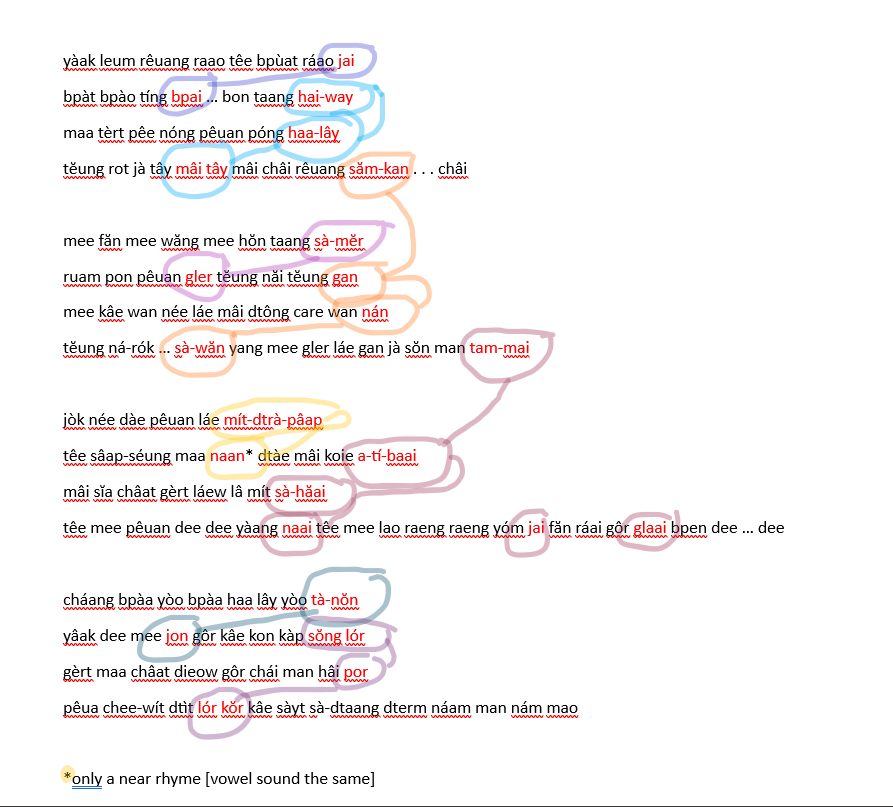Quickly,
1) The last word of the first line rhymes with the middle of the second line.
2) The ends of the second and third lines rhyme with each other, and with the middle of the fourth line
3) The last word of the last line rhymes with the ends of the second and third lines OF THE NEXT VERSE.
So for instance, in that ultra-catchy motorcycle song “เพื่อชีวิตติดล้อ” (“For Life on Two Wheels”), that Add Carabao wrote and sings with Sek Loso, I’ve highlighted the rhymes in the lyrics below this video:

In addition, it’s good to have words next to each other match in some way (rhyme, near rhyme, alliteration) if possible, especially at the early part of the line. So for instance, in the 4th verse (I don’t see it in the other verses):
ยากดีมีจนก็แค่คนขับสองล้อ
yâak dee mee jon gôr kâe kon kàp sŏng lór
เกิดมาชาติเดียวก็ใช้มันให้พอ
gèrt maa châat dieow gôr chái man hâi por
เพื่อชีวิตติดล้อ ขอแค่เศษสตางค์ เติมน้ำมันน้ำเมา
pêua chee-wít dtìt lór kŏr kâe sàyt sà-dtaang dterm náam man nám mao
And the last verse has this going on with both similar vowel sounds and alteration:
เอ้า…สองล้อพอเพียง แค่นี้ก็เพียงพอ
âo … sŏng lór por piang kâe née gôr piang por
สองล้อพอเพียง ชีวิตที่เพียงพอ
sŏng lór por piang chee-wít têe piang por
And here is my singable, rhyming translation of “เพื่อชีวิตติดล้อ” (“For Life on Two Wheels”).** This is one of the later singable translations done after learning of this rhyming scheme. (More recent singable translations should all have this feature, while my earliest singable translations do not.) At the risk of confusing things, I’ve also pointed out some “bonus” rhymes in the last line, arguably similar to the pattern of the original song:
อยากลืมเรื่องราวที่ปวดร้าวใจ
Forget the worries that pain your mind
ปัดเป่าทิ้งไป…บนทางไฮเวย์
Toss them behind on a highway
มาเถิดพี่น้องเพื่อนพ้องฮาเล่ย์
Come Harley friends let’s leave today
ถึงรถจะเท่ ไม่เท่ ไม่ใช่เรื่องสำคัญ ใช่
Two wheels? OK. Cool deal. For real, it’s swell . . . yeah
มีฝันมีหวังมีหนทางเสมอ
With dreams and hope, you have a path to ride
รวมพลเพื่อนเกลอ ถึงไหนถึงกัน
Friends at your side to heaven or hell
มีแค่วันนี้และไม่ต้องแคร์วันนั้น
There’s just today. Other days, oh well!
ถึงนรก…สวรรค์ ยังมีเกลอและกัน จะสนมันทำไม
If bad luck fell, we’d have friends and roads that bend, so why worry too?
*จอกนี้แด่เพื่อนและมิตรภาพ
I’ll raise this glass: I love you guys
ที่ซาบซึ้งมานานแต่ไม่เคยอธิบาย
Though I’ve disguised just how much it is true
ไม่เสียชาติเกิดแล้วล่ะมิตรสหาย
I’ve kept my homeland and all of you*
ที่มีเพื่อนดีๆอย่างนาย ที่มีเหล้าแรงๆย้อมใจ ฝันร้ายก็กลายเป็นดี…ดี
With GOOD friends like this crew, en-courag-ing me through, bad dreams change into sweet
**ช้างป่าอยู่ป่า ฮาเล่ย์อยู่ถนน
Elephants in woods, Harleys on the road
ยากดีมีจนก็แค่คนขับสองล้อ
Don’t load much stuff, I’m roaring down the street
เกิดมาชาติเดียวก็ใช้มันให้พอ
We get one life. Use it complete,
เพื่อชีวิตติดล้อ ขอแค่เศษสตางค์ เติมน้ำมันน้ำเมา
So it’s enough. Two wheels, just pay for fuel, and drinking up
Solo *, **
เอ้า…สองล้อพอเพียง แค่นี้ก็เพียงพอ
All I need’s my bike. Just this, I’m alright
สองล้อพอเพียง ชีวิตที่เพียงพอ
All I need’s a bike. The life that’s alright!
You can also rhyme the last word of a verse with the end of the first line of the next verse. The pattern of the กลอน (glon) is also easy to see in the new song “บันไดรุ้ง” “Ban-Dai Rung” (“Rainbow Stairs”) that Add Carabao posted on Facebook (look at the Thai and not the English; I did not do a rhyming translation). In fact “Rainbow Stairs” may be a purer example of a glon because the last line of each verse of “For Life on Two Wheels” is unusually complicated. Look out for the glon rhyming pattern in the lyrics of the Thai songs you listen to.
* I now have a better translations of this line (“I’ve lived my life well with all of you”) reflecting that “เสียชาติเกิด” means “wasted one’s life” (not “abandoned one’s homeland”) as previously [mis]understood.
** My direct, non-rhyming translation of “เพื่อชีวิตติดล้อ” (“For Life on Two Wheels”) is HERE.
